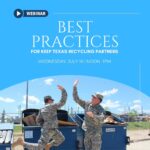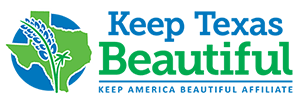While KTB has primarily fulfilled its mission by supporting communities and delivering a variety of programs that address community improvement, beautification, litter prevention, waste reduction and recycling, we firmly believe that strong public policies that support these goals are critically important.
Policy Platform
Overview
Keep Texas Beautiful (KTB) has been committed to making Texas communities better places to live, work and play for more than fifty years. Texas is a beautiful state with abundant natural resources, but our explosive population growth and solid waste management challenges are putting a strain on our ability to keep our communities clean and beautiful.
While KTB has primarily fulfilled its mission by supporting communities and delivering a variety of programs that address community improvement, beautification, litter prevention, waste reduction and recycling, we firmly believe that strong public policies that support these goals are critically important as well. Policymakers play an essential role in ensuring that the public, private and nonprofit sectors are all working together to make Texas the cleanest, most beautiful state in the nation.
Policy Priorities
Information
Accelerate statewide education efforts to better inform Texans on how they can contribute to making Texas a more beautiful state
It is clear that Texas needs to significantly increase the level of public awareness to move the needle on our current solid waste management challenges. According to Keep America Beautiful’s 2021 Public Attitudes Survey, only about one-third of Americans are receiving litter prevention messaging.
Read More
KTB believes policymakers should prioritize comprehensive and effective statewide messaging campaigns that will help Texans make informed decisions about how the proper disposal of products they use daily can improve their communities. The Texas Commission for Environmental Quality’s (TCEQ) Take Care of Texas campaign and the Texas Department of Transportation’s (TxDOT) Don’t mess with Texas campaign have made a significant impact, but more can be done to reach every Texan at a regional level.
Texas state law requires litter prevention information to be included in the Texas driver’s education curriculum and school districts are required to have recycling programs. Educating our younger generations on these topics is extremely important. KTB supports the addition of litter prevention and recycling topics to the state’s environmental science curriculum and increased resources for state agency grant programs that fund consumer education and outreach initiatives at the state and local levels. KTB also supports efforts that ensure that the required litter prevention and recycling education is taking place.
Local governments should explore additional outreach efforts such as “cart tagging” programs which can help educate residents and increase the volume of viable recyclables by decreasing contamination. These programs reduce the amount of contaminated materials in curbside recycling carts and can also generate important data to help local governments tailor effective educational messaging about recycling best practices to their residents.
Funding
Existing financial incentives and disincentives must meet Texas’ beautification and community improvement needs and new, innovative funding solutions should be explored
Robust funding for recycling, litter prevention, beautification and community improvement efforts in Texas is not only critical to preserving the state’s natural environment and waterways, but these investments also generate economic development benefits for local communities across the state.
Read More
KTB believes that fees associated with municipal solid waste, such as the state disposal fee, landfill tipping fees and pay-as-you-throw user fees, should strike the right balance between reducing the amount of waste going into landfills and incentivizing recycling. Texas should also explore expanding the use of state and local Hotel Occupancy Tax revenue for community improvement and beautification efforts that promote tourism.
KTB also supports increasing grant and loan programs that enable local governments and businesses to purchase new equipment that will expand capacity and increase recycling by addressing regional solid waste infrastructure gaps, particularly in rural areas. TCEQ infrastructure grants distributed through the Texas Regional Councils of Governments are essential, but funding is not adequate to meet the state’s growing waste management and recycling needs and is often diverted to fund other budget demands. Clean water grants should be leveraged to fund much-needed litter capture infrastructure in waterways, such as socks, skim boats and baskets, before trash makes its way downstream.
New and innovative funding solutions should also be explored, such as incentive programs that assign value to commonly littered or dumped items. The litter problem in Texas is increasing exponentially and we need to ensure that our investment tools are positioning the state to meet the magnitude of this growing challenge.
Solid Waste Policies
Adopt policies that increase the amount and quality of solid waste recycled in Texas
TCEQ’s Texas Recycling Market Development Plan indicated that 12.9 million tons of municipal solid waste was recycled statewide in 2019, which resulted in a statewide municipal solid waste (MSW) recycling rate of 27.5 percent. The report also found that approximately 16 million tons
of MSW disposed in Texas landfills (43.8 percent) could have been recycled, resulting in up to $2 billion of loss. The Plan indicated that MSW recycling in Texas is a $4.8 billion industry that has a positive impact on the Texas economy.
While there are several underlying factors behind these statistics, including recycling access, geographical limitations and contamination issues, KTB believes that Texas must significantly improve the state’s recycling rate and we support public policies that will help accomplish this goal.
Read More
KTB supports greater state and local government and private industry collaboration to create consistent guidance for recycling across the state to reduce consumer confusion, increase proper recycling habits and lessen detrimental contamination.
Additional facilities with greater processing capacity for recyclables are needed to address major infrastructure gaps at the regional and local levels, including additional facilities to handle hard-to-recycle items like household hazardous waste, organic materials and bulky items.
New end markets are essential to ensuring success, particularly in light of recent import restrictions on recycled materials imposed by China and other Asian countries. The state is well positioned to build upon its recycling success and gain significant economic and environmental benefits by improving the collection, processing and expansion of end markets for recyclables in Texas.
Tools & Resources
Address littering in Texas by providing law enforcement and local communities with more tools and resources and enforcing and strengthening existing laws.
According to Keep America Beautiful’s 2020 Litter Study, there are currently 50 billion pieces of litter across roadways and waterways in the United States, which equates to 152 pieces of litter for every American. The State of Texas, local governments and community organizations spend millions of dollars annually to clean up litter across our state, which has a significant impact on our state’s natural environment and economy. Accurate statewide litter data is critically important and tracking tools such as the Texas Litter Database will help Texas make informed policy decisions on how we can best address this problem in local communities.
Read More
Texas state law assesses litter and dumping penalties by weight. On the low end, it is a class C misdemeanor punishable by a fine up to $500 in Texas to improperly dispose of litter weighing five pounds or less. On the high end, it is a state jail felony punishable by a fine up to $10,000 and imprisonment up to two years to illegally dump litter weighing 1,000 pounds or more (or 200 pounds or more for commercial dumping).
KTB believes Texas can do more to hold people accountable who litter and illegally dump trash by consistently enforcing existing laws. We support additional training for law enforcement on the environmental impacts of this activity and increased funding to hire more code enforcement officers and purchase cameras to identify and pursue those who illegally dump in certain areas. Texas should also consider strengthening existing laws to create a greater disincentive against illegal dumping. The state could explore laws that impose larger penalties to curb the illegal dumping of specific items or dumping that takes place in environmentally sensitive or public areas.
The State of Texas should also increase grant opportunities for local governments and community organizations to assist with litter clean-up efforts across the state. These grants more than pay for themselves by offsetting the costs of litter clean-up to the state and taxpayers.
Resources
- City-related bills filed, updated regularly
- This resource gives some good information on TML’s involvement in the legislative process and shows just how many bills filed and passed affect city’s decision making
Texas Association of Business
Works in a bipartisan manner to protect and enhance the Texas business climate and make the state’s economy strong
- TAB’s state priorities
- TAB’s scorecard from the 87th Legislative Session – how legislators voted on specific bills that impact small and large employers across Texas
Who represents me?
Use this tool to find your representatives


